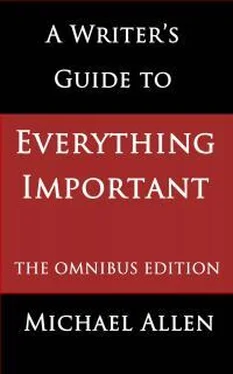To the scientist, however, the grass might represent something to be taken to the laboratory and tested for chemical content. To the cow, the grass would probably represent food.
Same stuff, grass, but two observers and two interpretations of the same information. In other words, in modern information theory, the observer becomes part of the equation.
Quantum mechanics and information theory both demonstrate that in any assessment of reality, the observer has to be taken into consideration. This contrasts with the view of nineteenth century scientists, to whom the observer was irrelevant; reality was thought to exist independent of any subjective viewer. But in the twenty-first century we are obliged to accept that the observer’s participation makes a difference.
14. Back to the Great Novels argument
When we consider fiction, we find an exactly analogous position to that which exists in quantum mechanics and information theory.
A novel exists as a physical object, a book. But the emotion which a novel creates is not of a fixed quantity or quality. The emotion varies according to language spoken by, and the frame of reference possessed by, each individual reader. The case for there being any such thing as a great novel is therefore fundamentally unsound.
This is not a secret. We already know this. We have seen it demonstrated many times over. When we come across a book which we ourselves find entrancing, we often recommend it warmly to a close friend whose tastes, we know, largely coincide with ours. But even then the friend may remain unmoved and unimpressed; the magic doesn’t always work.
And why doesn’t the magic doesn’t always work? Because of the way in which emotion is generated. We know (because it was explained earlier in this book) that, in real life, the series of events for creating emotion is: stimulus; conscious or unconscious thought; physical response.
The same mechanism operates, or fails to operate, when we read fiction. A stimulus is provided by the printed word; this creates conscious or unconscious thoughts, and stirs up memories; and a physical response may or may not arise.
Each reader (observer) brings to this interaction of stimulus, thought, and physical response, her own set of experiences, memories, hopes and fears. The contribution from the reader may or may not interact with the stimulus provided by the writer in the ways which the writer intended and hoped. The precise opposite of what was intended may occur. The intensely serious play by an intensely serious young man may play like a farce which has the audience folded up with laughter.
There is not, literally, a two-way exchange of traffic between the novel and the reader; the words on the printed page do not change. But there is certainly an interchange, and there is certainly two-way traffic, metaphorically speaking. The reader invests the book, temporarily, with her own biochemistry and receptivity, and the novel succeeds, or fails, accordingly.
It follows, therefore, that great novels do not exist as entities in their own right. A novel only has the power to generate emotion when a reader of the right kind comes across it. And this is true whether we are talking about D.H. Lawrence or a Mills and Boon romance.
15. There is no hierarchy of fiction
Most professors of English literature, and most of the highbrow literary critics of this world, would have you believe that there is, metaphorically speaking, a hierarchical tower of fiction. This tower is something like a block of flats. At the top, in the exclusive penthouse, is a small amount of ‘literature’, i.e. Great Novels. In the basement is a large heap of trash.
Now, I am not much impressed by some of the more extreme feminist arguments about dead white European males, but I do have to admit that all this hierarchy malarkey has a distinctly masculine feel to it. The idea is almost phallic. Furthermore, it is a theory which is for the most part advanced by men, and curiously enough it embodies the belief that most of the good stuff, at the top of the tower, is written by men. The ‘generalised rubbish’ at the bottom of the fiction pile is often identified, when push comes to shove, as romantic fiction, or women’s fiction.
The truth, however, is that there is not a top-to-bottom hierarchy of fiction, with great books at the glorious summit and ‘trash’ or ‘pulp’ at the unspeakably vulgar bottom. If we must think of the range of available fiction in visual terms, it is best to think of a broad spectrum of books, which runs horizontally. You might care to imagine a street in which every building is a bookshop containing a particular kind of fiction.
This range, or spectrum, of fiction consists of a variety of types of novels which are accessible at different points to different kinds of readers.
Not every book appeals to every reader, in the sense that each and every reader will inevitably feel its emotional impact. It has never been so, and it never can be so. A novel will only ‘speak to’, and generate emotion in, those readers who are capable of understanding its language, and who possess the relevant frame of reference.
Let me remind you of what Edgar Allan Poe said, in that paragraph which I quoted earlier in. He spoke of a short story being appreciated ‘in the mind of him who contemplates it with a kindred art .’ (Italics added.) ‘With a kindred art’ is Poe’s way of saying that you need to speak the right language and possess the right frame of reference.
As we grow older, and learn more, our knowledge of ‘languages’ usually expands, as does our frame of reference. We do not usually read and enjoy the same novels at age seventy-five as at age fifteen. At different stages of our lives we may very well access the spectrum of fiction at different points.
We know instinctively what we want from fiction, just as an animal knows when it needs salt, or water, and we seek it out. We read reviews, we ask our friends for advice, we question librarians and booksellers. But the point is that we move sideways on the available menu, not upwards – or even, occasionally, downwards.
This visual image of the range of fiction is, I suspect, a softer and more feminine view than the one which is offered to us by males.
And do you want to know why men are so keen on the hierarchy idea? Because it permits those who hold power in this particular arena to impress the opposite sex.
You think I’m joking? Try attending a party given by one of the leading literary publishers and watch the young lions (male writers) being surrounded by gullible young women. Seems to work every time.
Then again, consider the vested interest of all those who teach the subject of English literature. They are all doing pretty nicely, thank you, preaching the 1947 party line, and they’re not too keen on having any revisionists question it.
The facts are really very simple. A book either works in terms of producing the intended emotion in a target reader, or it does not.
For instance, a literary work by, say, Salman Rushdie either fascinates and enthrals and ‘delivers’ to those who normally enjoy contemporary literary fiction, or it does not. Similarly, a Mills & Boon hospital romance either works for regular hospital-romance readers, or it doesn’t. If a particular novel does satisfy most readers in the target audience, it may be said to be successful. To insist on calling it a ‘good’ book or a ‘great novel’ really doesn’t help much.
Personally I do not believe that a book can be said to be good or bad in any absolute sense – it is only successful or unsuccessful in terms of its intended audience. And its intended audience, to repeat a point made earlier, is a group of people who speak a particular language, either literally or metaphorically; it is a group of people who share a set of interests and a common frame of reference.
Читать дальше












